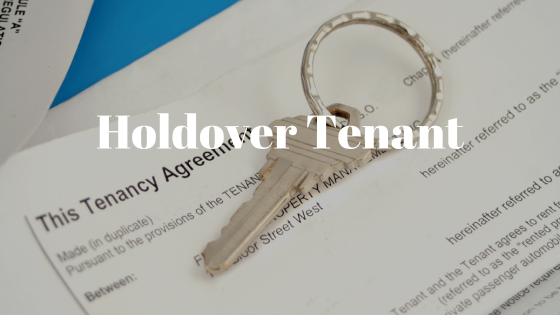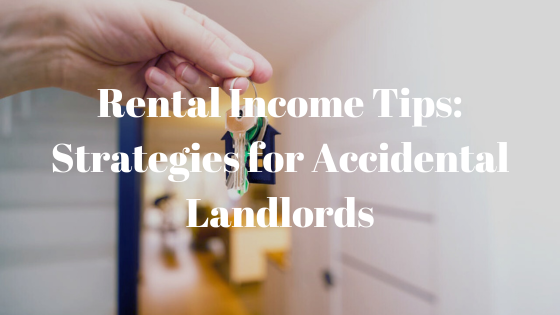Holdover Tenant

As a landlord, you know that managing tenants can be challenging. From screening applicants to collecting rent and handling repairs, there's no shortage of tasks to keep you busy.
But what happens when a tenant's lease expires, and they refuse to leave? This is known as a holdover tenancy, and it can cause significant headaches for landlords.
Holdover tenants can create many problems, from property damage to lost rental income. That's why landlords need to understand how to handle these situations effectively and
protect your investment. In this blog post, we'll explore everything you need to know about dealing with holdover tenants, from legal considerations to eviction procedures.
Legal Considerations for Holdover Tenants
Legal considerations are essential to dealing with holdover tenants as a landlord. When a tenant remains on your property after their lease has expired, you must follow specific legal procedures to avoid potential legal issues or liabilities.
One of the first legal considerations when dealing with holdover tenants is understanding the state and local laws that govern these situations. Laws regarding holdover tenants can vary widely by location, so it's crucial to research the laws in your area to ensure that you follow the correct procedures.
For example, some states may require landlords to provide a certain amount of notice before initiating eviction proceedings, while others may have specific requirements for serving notice to tenants. Additionally, some jurisdictions may restrict the rent a landlord can charge a holdover tenant or limit the landlord's ability to collect damages or other fees.

Once you understand the laws in your area, you can explore the legal remedies available to landlords dealing with holdover tenants. In some cases, you may be able to negotiate a new rental document like a lease or rental agreement with the holdover tenant, either on a short-term or long-term basis.
If negotiations fail, however, the next step is to initiate
eviction proceedings. The eviction process can be lengthy and complicated, so it's essential to understand the legal procedures involved, including serving notice to the tenant, filing the necessary paperwork with the courts, and appearing in court if necessary.
Consequences of Retaining Holdover Tenants
Dealing with holdover tenants can be a challenge for landlords, particularly when it comes to deciding whether to allow them to remain on the property or take legal action to remove them. While there are situations where allowing a holdover tenant to remain may be the best course of action, it's important to understand the potential consequences of this decision.
Consider the following before allowing holdover tenants to remain in your rental:
Increased Risk of Property Damage
When a tenant's lease expires, and they remain on the property without permission, the landlord loses their ability to monitor and regulate the tenant's behavior. This lack of oversight can increase the risk of property damage, particularly if the holdover tenant becomes hostile or uncooperative.

For example, a holdover tenant may damage the property by intentionally or accidentally causing a fire, flooding, or breaking fixtures and appliances. They may also neglect routine maintenance, leading to costly long-term damage. In some cases, holdover tenants may even bring in unauthorized guests or pets, which can cause damage.
Potential Loss of Rental Income
Another consequence of allowing holdover tenants to remain is the potential loss of rental income. If the holdover tenant is not paying rent, the landlord is losing out on a significant source of revenue.
Even if the holdover tenant is willing to pay rent, the landlord may be able to charge a higher rate to a new tenant, meaning they are still losing out on potential income and
impacting their ROI.
Moreover, if the holdover tenant damages the property or drives away other tenants, this can further harm the landlord's ability to generate rental income in the future.
Negative Impact on Landlord Reputations
Finally, allowing holdover tenants to remain can have a negative impact on the landlord's reputation. Other tenants may view the landlord as unable or unwilling to enforce lease agreements, which can cause frustration and erode trust.
Additionally, potential future tenants may be hesitant to rent from a landlord with a history of holdover tenants, particularly if they perceive the landlord as unable to manage their properties effectively.
Strategies for Dealing with Holdover Tenants
When dealing with holdover tenants, landlords have several options. Below are some common strategies:
Negotiation involves trying to reach a mutually beneficial agreement with the holdover tenant. This could involve offering them a short-term lease, increasing their rent, or other incentives to encourage them to leave the property. Sometimes, holdover tenants may be willing to negotiate if they have no other options.

Another option is to offer the holdover tenant a renewal of the lease. This would involve drafting a new lease agreement outlining the tenancy terms and conditions going forward. This strategy can be effective if the holdover tenant is willing to stay and pay rent and the landlord is willing to continue renting to them,
If negotiation and renewal of the lease are unsuccessful, landlords may need to take legal action to remove the holdover tenant. This can involve sending a formal notice to vacate, filing an eviction lawsuit, or obtaining a court order for possession of the property. Legal action can be time-consuming and expensive, but it may be necessary if other strategies fail.
Eviction Process for Holdover Tenants
The eviction process for holdover tenants varies by state and locality but generally follows a similar approach to other types of evictions. The landlord must first send a formal notice to vacate, giving the holdover tenant a period to leave the property voluntarily.
If the holdover tenant fails to vacate the property within the specified time frame, the landlord can file an eviction lawsuit. The lawsuit will typically include a request for possession of the property and any unpaid rent or damages owed by the holdover tenant.

The holdover tenant will be able to respond to the lawsuit and present a defence. If the court rules in favor of the landlord, they will issue a judgement for possession of the property. The order may be enforced by a sheriff or other law enforcement officer, who will remove the holdover tenant from the property.
Landlords must follow all legal procedures when evicting a holdover tenant, as failure to do so can result in legal liability and additional costs. It's also important to remember that eviction should be a last resort and that other strategies, such as negotiation and renewal of the lease, should be attempted first.
Conclusion
Dealing with holdover tenants can be a difficult and frustrating experience for landlords. While legal remedies are available to remove holdover tenants, it's essential to understand the potential consequences of allowing them to remain on the property. As such, landlords should carefully consider their options and try to negotiate or renew the lease before resorting to legal action.
At
Dawson Property Management, we understand the challenges of dealing with holdover tenants and offer comprehensive property management services to help landlords navigate these situations. If you're dealing with a holdover tenant and need assistance, contact us today to learn more about our services and how we can help protect your investment property.







